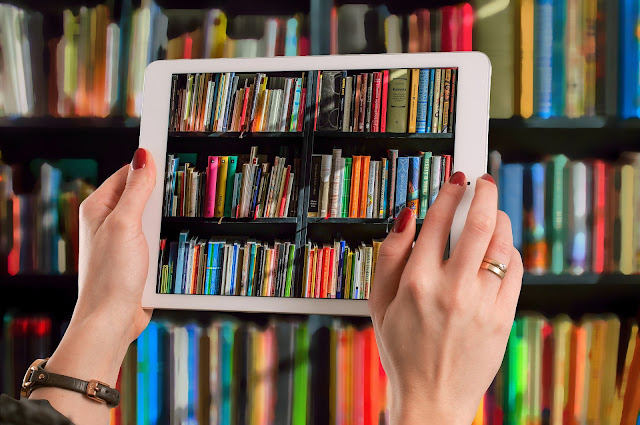LIBRARIES IN DEVELOPING NATIONS... IT'S NOT JUST ABOUT THE BOOKS!
 |
| (Image courtesy of Pixabay - no attribution required) |
Full disclosure: I know absolutely nothing about this topic. Therefore, before even beginning this post, much research was required. Once I began reading about Library for All, the International Federation of Library Associations & Institutions (IFLA), the UN 2030 Agenda for Sustainable Development and Bibliothèque Sans Frontières (Libraries Without Borders) among others, I found myself amazed at the work many organizations are undertaking in order to create a world with universal literacy and also understood more clearly the role libraries play in developing nations to help end poverty.
The UN 2030 Agenda for Sustainable Development signed in 2015, is a framework of 17 goals touching on economic, environmental and social development and it's ultimate goal is to make the world a better place for all human beings. Libraries have been identified as key partners in achieving these goals. (IFLA) Especially in the developing world where libraries are in place, evidence shows that they provide access to information and technology, they protect cultural heritage and they contribute to developing literacy skills. (Hamilton, 2013)
If one is to be serious about eradicating poverty, one of the best ways to do this is for organizations and governments to improve access to information and technology. One group that is tackling this problem is NABU.ORG (formerly known as Library for All.Org).
This not for profit society collaborates with many partners be they corporate or governmental, to bring access to digital books through the use of mobile technology like smart phones and tablets. Currently they have projects in Haiti, Democratic Republic of Congo, Rwanda, Cambodia and Mongolia. I was most interested in how NABU/LFA addressed the issues around reading and learning in another language. I was shocked at the following statistic: there are 7000 languages on this planet being spoken; 96% of those languages are only spoken by 4% of the world's population. (LFA blog, 2018). Therefore, providing access to digital books doesn't solve literacy issues if learners do not have access to books in their mother tongue. In order to solve this real world problem, NABU/LFA is providing workshops to local authors on how to write and publish e-books. These workshops have produced for example, 260 original children's books in Creole in Haiti. A partnership with a Rwandan publisher named ImagineWe has led to the creation of digital books in Kinyarwanda, the language of the Rwandan people. This project not only addresses the issues of literacy but also the UN's goal to help preserve culture which makes it unique and invaluable.
Another organization innovating in the developing world is Bibliothèques Sans Frontières (Libraries Without Boarders) established in 2007. This society out of France has several different projects however the one that caught my eye was their work in humanitarian crisis intervention. BSF has identified that in refugee camps for example or after a natural disaster, aid comes in the form of food, shelter, water, sanitation, security, etc. However, once these basic needs are met, BSF argues that in order to heal and recover as humans, we need access to information and tools to help with communication. In order to deal with this problem, BSF came up with two solutions: Idea Boxes & KoomBook. Ideas Boxes are:
"... a portable multi-media toolkit. Standardized, easy to transport and set up, the Ideas Box is a robust device with minimal energy needs and its own power source. Furthermore, its contents are customized to the needs of the populations, to their language, and to their culture." (Ideas Box, BSF)
 |
| (Image from Ideas Box) |
These Ideas Boxes have been dispatched in Haiti (after the earthquake in 2010), in Syria but also in economically deprived communities in New York and Paris for example. They include things like tablets and a TV for reading/information and entertainment but also paper, pens and pencils for writing and drawing among other things. The ultimate goal is to save human intellect and help victims of humanitarian crisis thrive and not just survive.
KoomBook is a simple and portable box the size of a book that provides a wifi hotspot so users can connect their devices and gain access to the net. The device can be placed in a school, a medical clinic or a refugee camp for example and allows up to 30 users to have access. BSF has come up with these innovative solutions to care for citizens in times of crisis.
Finally, I learned that lending libraries are rare in Central and Southern America. In an effort to deal with this, HJH Libraries for All, a non profit charitable organization, has created the first lending library in Nicaragua with much success. Providing a space and books in Spanish for the citizens of San Juan del Sur has helped bridge the gap between the Have and the Have Not. In Latin America, it is usually only the rich who have access to books but HJH Libraries for All has decentralized access and also created mobile "Librairies in a Box" and mentored and trained many locals on how to be a librarian. This organization from Colorado has some religious affiliations, like many charities which causes me to hesitate to support their work. I sometimes worry that aid to developing countries is not really free as it is often tied to accepting religious indoctrination. That said, HJH Libraries for All does not appear to impose its views on participants in the project.
In the 2014 EFA Report on Teaching & Learning: Achieving Quality for All Summary, it was noted that targets for eradicating poverty or equalizing disparity were not being met. For example, adult literacy rates are at a standstill. Since 2000, literacy rates have barely dropped 2%. One third of the world's illiterate adults are women. It is expected to take until 2072 for women from the poorest countries to achieve universal literacy. (UNESCO, p.5) There is much work to do as we can see which shows how important libraries and access to information are especially in the developing world. Libraries and partnerships provide opportunities to improve the future. Thank goodness for the innovation and generosity of those who seek to create a better world for ALL.
SOURCES:
Bibliothèques sans Frontières. (2007). "Urgences, post-conflits et construction pour la paix". BSF.
Evans, Tanyella. (2012). "Our Mission". Library For All.
Hamilton, Stuart. (2013). "Stamping Out Poverty as Well as Books? How Libraries can support development". The Guardian. March 12, 2013.
HJH Libraries for All. (2003). "San Juan del Sur Biblioteca".
Ideas Box. (N/D). "Discover the Ideas Box". BSF.
International Federation of Library Associations & Institutions. (2017). "Libraries, Development and the United Nations 2030 Agenda". (August 9, 2017).
N/A. (2015) "Library for All". Youtube. 1:22
N/A. (2018). "International Mother Language Day: Ysolde and Her Magical Shoes". Library for All Blog. Feb. 21, 2018.
UN Department of Economic and Social Affairs. (2015). "Transforming Our World: UN 2030 Agenda for Sustainable Development".
UNESCO. (2014). "Teaching and Learning Summary 2014: Achieving Quality for All."


Great post; you have provided good discussion of several programs in different countries and on the use of mobile devices. You also included very good discussion of many of the issues and considerations involved, such as access to books in different languages. I also felt amazement reading about the initiatives that are underway!
ReplyDelete